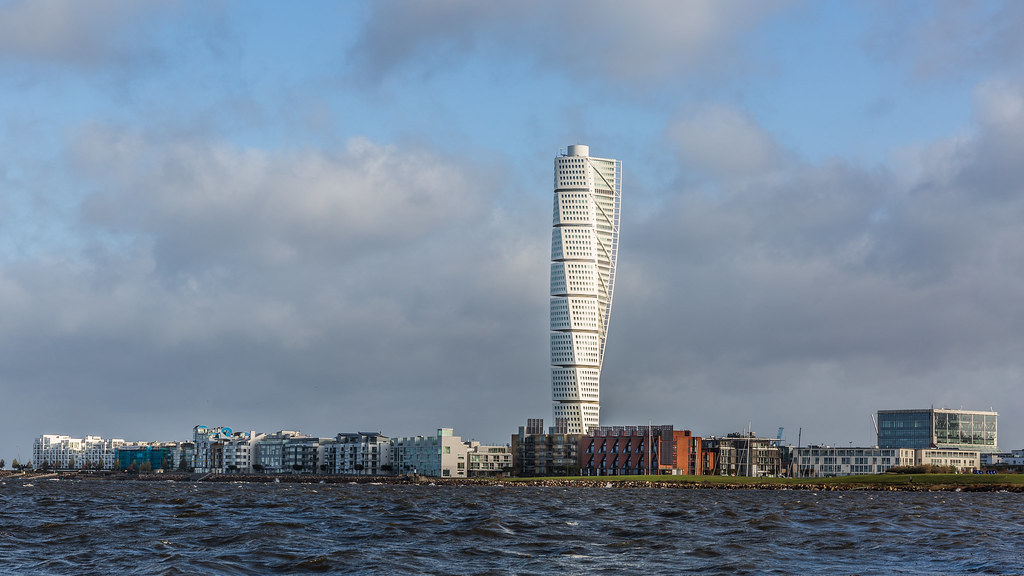Hjalmar Falck, Verksamhetschef Fastighetsägare BID Sofielund

Cities around the world face an enormous challenge in becoming healthy places to live, while reaching net-zero emissions in just a few years. The changes needed are enormous, but feasible. Success will depend on at least two factors. One – citizens will need to engage with – and confront – those who own and operate cities (including mayors, business leaders and regional and national authorities). And two – governance and policies that promote systems thinking and whole systems transformation.
Innovation can be a crucial driver for change, but only when it’s part of a an integrated approach to urban development. EIT Climate-KIC is working with some of the most ambitious mayors and municipalities in Europe to helps them deliver systemic change.
Two members of EIT Climate-KIC’s innovation community, Malmö and Copenhagen – outshine many of their European peers when it comes to finding new ways to bring about systemic and holistic change. Malmö’s current focus is on meeting the UN’s 17 Sustainable Development Goals (SDG) goals and 169 subgoals
by 2030. At the same time, it aims to become climate-neutral and powered entirely by renewable energy. Copenhagen is hoping to become the world’s first carbon-neutral capital city by 2025.
To meet these challenges, new approaches are needed. Malmö has, with the support of its political leadership, pushed for innovative programmes involving residential areas and districts across the municipality. The Swedish city intends to lead structural changes to the social, economic and financial systems that govern our cities – from systems-literate policies to governance and innovation.
In the Öresund region, home to approximately 4 million people and more than 150 different languages, we see evidence of a growing cluster – an ecosystem – of innovative sustainable cities. Old structures are giving way, and new forms of collaboration between municipalities, companies, institutions, organizations, investors and voluntary organizations are emerging. In sectors as diverse as energy, transportation, health, food, culture, education, planning and construction, sustainability programmes are being developed and approved by the city’s decision-makers. And collaboration in Öresund occurs not just between the major cities of Malmö and Copenhagen, but between a wide range of partners
on regional, national and global levels in and outside Scandinavia.
Malmö has developed a portfolio of successful sustainability projects. Perhaps most famous among them is Bo01, a neighbourhood development in the Västra Hamnen district dating back to 2001. The district’s energy supply is completely self-sufficient, and is generated entirely by wind, solar energy and biogas. The buildings’ air conditioning is powered by solar panels, heat pumps, seawater and
groundwater.
Other districts in Malmö, like Augustenborg, Hyllie, Sege Park, Lindängen and Sofielund, have also produced innovative projects in recent years, including BID, Urban Labs, Living Labs, Neighbourhood Economics, Finance Lab and the Smart Sustainable Districts. All are geared towards reorganizing the way the municipality and its citizens operate. Today, Malmö has about 370,000 inhabitants, of which 25,000 are employed by public or municipal organisations. Of these, more than 50 are civil servants in a
special office dedicated to sustainable urban development. It cannot be overstated how important leadership – in relation to accountability, monitoring and reporting – is to management organisations’ training programes, which in turn minimise risks associated with ambitious program targets.
Malmö University is one national institution promoting systems innovation projects. A development centre for social innovation, Mötesplats Social Innovation (MSI), has becomes an important part of the network of development clusters in Malmö. MSI is a Swedish and international knowledge hub for social
innovation and entrepreneurship. Together with academia, business and public and non-profit actors, the organization aims to meet societal challenges by building capacity for innovation.Read more about the Social Innovation Summit here: https://sisummit.se/om-sisummit/english/social-innovation-summit/
BID – Neighborhood economics based on holistic systems modeling In 2019, a new development was launched in Sofielund – a residential area once identified as one of Malmö’s five most problematic neighborhoods that has sinceturned around its reputation. Rogue landlords have left the area, and the remaining municipal, cooperative and private property owners have created a new company to support a BID process in the area.
Over eight years ago, property owners in Sofielund started a business improvement district (BID) process that is now supported by their new company Sofielund Development Ltd. The company´s framework offers opportunities to trade in real estate, encouraging increased socio-economic and
environmental responsibility from the property owners. A BID is a defined area within which businesses are required to pay an additional tax, or levy, in order to fund projects within the district’s boundaries. BIDs are, often primarily, funded through this levy, though they can also draw on other sources of public and private funding. The idea originated in the United States, where such projects emerged in residential areas in various states during the 1970s. Link https://en.wikipedia.org/wiki/Business_improvement_district
Today, there are around 1,000 BIDs in the USA. They also operate in Australia,New Zealand, South Africa, Jamaica, Serbia, Albania, Ireland and Singapore, among other countries. A new European network of BID projects in the Netherlands, Germany and the UK has now been set up. Sofielund’s BID gives impetus to organisations that treat innovation and systems thinking as logical parts of their businesses. The creation of a collaborative structure for the residential area means that public sector organisations are also better integrated. Greater responsibility is taken for the area’s social, economical and environmental challenges, with funding coming from both private sources and municipal budgets, supported by voluntary engagement from a committed local population and interest groups.
In an area of 12,500 households, a total of 980 different activities are up and running, from a small football club to a bakery with over 600 employees. There are also 60 housing co-operatives and 150 sport, culture or social organizations. All act as catalysts for cooperation and achieving common goals. The results are evident across Sofielund, particularly in the reduction of problems that previously characterized the area – crime and property mismanagement. Since 2015, the number of individuals linked to crime in the neighborhood has decreased from some 60 people to about 5, according to Hjalmar Falck, who led much of the work in neighborhood and now serves as the CEO of its new
organization in the BID – 45 members today including investors, real estates, businesses and housing co-ops. The rogue property owners have almost entirely disappeared from Sofielund, too. The negative stereotypes surrounding Sofielund no longer ring true, said Falck.
“Leadership is important, and my role as coordinator for the [BID’s] various businesses gives birth to innovative processes that I can support and develop with others in the area,” said Falck. “We will never lose contact with our local neighbourhood. The sectorised ‘silo’ thinkers have disappeared and we
are working together for our common good. “Financially, we save resources for our own operations and for the municipality’s budget,” he added.
Residential areas in Malmö have their own distinct identities, based on their unique economic and cultural histories, which produces varying conditions when trying to develop solutions to certain problems. Different neighborhoods also differ in terms of crime, education, unemployment, entrepreneurship, language and cultural background. The resources for urban development are
traditionally connected to municipal budgets and are raised through taxes. At a time when municipal budgets are tightening, neighborhoods need to find new ways to resource and finance such projects. BIDs are an excellent example of how property owners can contribute to the city’s development. To date, about 1 million Swedish kronor per year ($103,000) has been invested in the BID programs in Sofielund.
Green and social innovation investments
Swedish municipalities drive the country’s green efforts through investment, procurement, regulatory supervision, urban planning and local infrastructure. In recent years, Malmö has also developed environmental investment through green bonds.
Political dialogue around social investments – and the policies and frameworks needed to implement them at a municipal level – is well underway, according to Claes Ramel, Head of Treasury city finance department. And Malmö isn’t the only city interested in integrating green and social investment into its operations. Important support for this will come from Kommuninvest, a Swedish finance cooperative that works with 90% of Sweden’s municipalities and has established innovative systems models for green and social bonds.
To find out more about Kommuninvest, visit: www.kommuninvest.se/en/ Malmö’s private banking sector is also taking an increasingly active part in the discussion, and has appointed municipal bank managers to develop social investments at a local level. The idea of supplementing municipal budgets with private capital entered discussion in 2017, inspired by the development of green bonds in the city of Gothenburg. Malmö issued its first green bond in November 2018, with an investment volume of 1.3 billion Swedish kronor ($134 million). The funds are focused on investments that create a climate-smart and sustainable Malmö, with a focus on reduced emissions. Reporting is made on the basis of principles outlined in Malmö’s green framework, Green Bond Principles, which the city adopted in 2017.
Through green financing, valuable collaborations and insights are created across Malmö’s administrations and companies, according to Ramel. In 2018, the first green bond financed a total of 29 investments, all of which contributed to the city’s efforts to implement global sustainability targets at a local level. The city invested in sustainable transport solutions like bicycle lanes and electric buses, as well as improved capacity for water purification and tree-planting. The evidence suggests that Malmö’s green bond reduced CO2 emissions by more than 4,345 tons over its first year. Annual renewable energy output grew by 2.6 GWh in 2018, while improvements to energy efficiency decreased consumption by 391.6 MWh per year.
How to trigger systematic change
Each year, new municipal projects encourage new types of sustainable development. But as politicians and officials come and go, the experiences of successful projects are not always passed on as effectively as they could be. In Malmö, new and innovative working methods are being tested. From the
council level through to civil servants, politicians have begun establishing new structures that can bring about more systematic change. With our focus on tackling climate change through systemic change, and the commitment of our nearly 400-member community to this mission, the EIT Climate-KIC network is playing a crucial part in pushing integrated and coordinated interventions (in political, economical, technological and social systems) along the value chain.
Many questions remain
How do political leaders gain experience from projects that challenge the existing structure of their municipality, especially when politicians come and go after elections? How can top-down and bottom-up approaches, alongside consensus leadership, secure a stronger systems thinking and innovation? How
can private investment by property owners – who are driven by increases in property values – play a role in evolving municipal finances? Can pension funds’ investment in real estate companies, or other companies operating in the municipalities, become a force for renewed, long-term financial thinking?
How can Malmö and other municipalities in the region share experiences from projects like Bo01 or BIDs into their urban administrations? Municipal organisations must, increasingly, interact with global, national, regional and local actors, with both policy and governance becoming important instruments for change. It’s about both a top-down and bottom-up approach. Will there be enough courageous political leadership to move from pilot projects to structural change? Can municipalities lay the foundations for a system where innovation and systems thinking become guiding principles in their future governance models?


